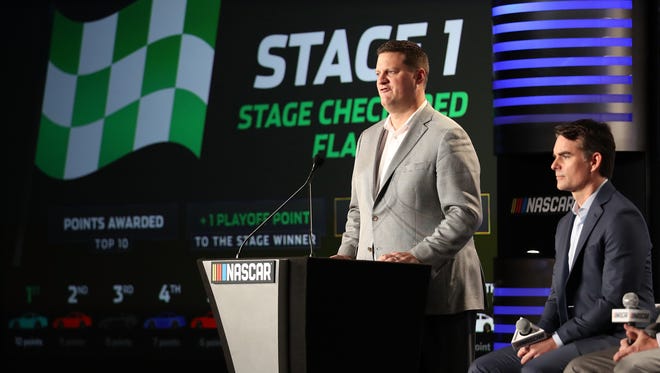James: NASCAR rule changes a risk worth taking
CHARLOTTE — It was an attempt to find something the curmudgeonly uncle in the Viagra jacket and the kid who sort of thinks Chase Elliott is cool can maybe agree upon.

It’s still one great big portion, but NASCAR has diced it up a bit so everyone can try to digest it.
NASCAR as an industry, after half a year of consultation with drivers, its fan council and social media’s temperament, implored its fan base to just give it a taste Monday, unveiling a system that it claims will give incentive for more dogged racing throughout the regular season.
There will be race segments (three per race in every national touring series) and bonus points (for winning a race and winning one of the segments) and sliding scales of points pushing drivers through the slog of a 26-race regular season and into the 10-race, 16-driver playoff, which is absolutely never to be called the Chase again.
MORE:
NASCAR unveils major changes to races, points
Lady Antebellum to perform pre-race concert at Daytona 500
Actor Owen Wilson named grand marshal for 2017 Daytona 500
The buzzword to describe this collection of math and hopes was "moments," and drivers and stakeholders brandished it often Monday. It was obviously a well-choreographed moment. The key seems to be avoiding migraines trying to explain the math and just watching how drivers chase points more often.
Either way, this was a risk worth taking for a sport in which three stars — Jeff Gordon, Tony Stewart and, surprisingly, Carl Edwards — have retired in the last two seasons and television ratings and turnstile counts underscore ongoing doldrums.
This was the sport’s hierarchy at work, not new title sponsor Monster Energy. It wasn’t change for the sake of an entrance, but change for the sake of fixing something. The trouble is the chasm between those who think there’s nothing that needs fixing and those who do.
NASCAR vice president and chief racing development officer Steve O’Donnell said the system was a "balance of both" forms of racing various factions want.
"We felt like our hardcore fans want to see their drivers rewarded for their efforts throughout the race and how do we tie that in not only with the race but all the way through the season," he said. "So we felt like by rewarding them with points for a stage and also giving them a playoff point that would do that. But then, yeah, looking at a race, how do you get someone who tuned in to check out NASCAR that I’m going to watch a little bit longer and see how my driver does in Stage One? And if we can do that, we can hopefully educate some folks about the sport."
MORE:
Legendary owners, drivers honored at NASCAR Hall of Fame induction
Sebastian Vettel defeats Busch brothers for Nations Cup
NASCAR announces start times, TV for 2017 Sprint Cup season
Certainly, NASCAR as an industry is a serial dabbler. The three years since the last major change, adding elimination rounds to the playoffs, seemed like eons in a sport in which the reality of constant change is overshadowed only by the incessant hand-wringing over the anticipation of it. And, yes, if NASCAR ran the NBA, there would probably be a 15-point shot.
This, said driver and NASCAR history buff Dale Earnhardt Jr., does not rise to that.
"These are little, subtle adjustments that I think are good," he said. "We sort of learn as we go and understand as we go. When we implemented the Chase years and years ago it was a profound difference in system. These are subtle changes, and I really like them."
And now the sport goes about making everyone feel that way.
Follow Brant James on Twitter @brantjames.
GALLERY: 2017 Monster Energy NASCAR Cup Series schedule
